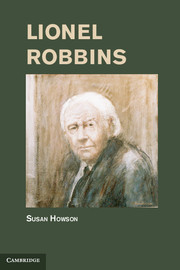Book contents
- Frontmatter
- Contents
- Illustrations
- Abbreviations
- Introduction
- One Father and Son
- Two The Great War
- Three Postwar
- Four The London School of Economics
- Five Iris Gardiner
- Six New College Oxford
- Seven The Young Professor
- Eight Fritz and Lionel
- Nine The School in the Mid-1930s
- Ten The Approach of War
- Eleven The Economics of War
- Twelve Director of the Economic Section
- Thirteen Anglo-American Conversations
- Fourteen The Law Mission and the Steering Committee
- Fifteen 1 9 4 4
- Sixteen The Last Months of the War
- Seventeen The Postwar Settlement
- Eighteen Return to the School
- Nineteen The End of the Transition
- Twenty LSE in the Early 1950s
- Twenty-One Chairman of the National Gallery
- Twenty-two Lord Robbins
- Twenty-three The Robbins Report
- Twenty-four The Sixties
- Twenty-five The Arts
- Twenty-six The Troubles at LSE
- Twenty-seven Retirement
- Conclusion
- Bibliography
- Index
Twenty - LSE in the Early 1950s
Published online by Cambridge University Press: 07 October 2011
- Frontmatter
- Contents
- Illustrations
- Abbreviations
- Introduction
- One Father and Son
- Two The Great War
- Three Postwar
- Four The London School of Economics
- Five Iris Gardiner
- Six New College Oxford
- Seven The Young Professor
- Eight Fritz and Lionel
- Nine The School in the Mid-1930s
- Ten The Approach of War
- Eleven The Economics of War
- Twelve Director of the Economic Section
- Thirteen Anglo-American Conversations
- Fourteen The Law Mission and the Steering Committee
- Fifteen 1 9 4 4
- Sixteen The Last Months of the War
- Seventeen The Postwar Settlement
- Eighteen Return to the School
- Nineteen The End of the Transition
- Twenty LSE in the Early 1950s
- Twenty-One Chairman of the National Gallery
- Twenty-two Lord Robbins
- Twenty-three The Robbins Report
- Twenty-four The Sixties
- Twenty-five The Arts
- Twenty-six The Troubles at LSE
- Twenty-seven Retirement
- Conclusion
- Bibliography
- Index
Summary
In the 1950s Lionel Robbins was in his fifties. There were family anxieties but his life at the School was easier than in the late 1940s. He shed the burden of many LSE committees but took on others outside the School. Although he left himself little time to write, it was in this decade that he published two of his lasting contributions to his discipline as well as a collection of essays, an edition of a classic in the history of economic thought and a dozen articles or published lectures. This chapter concentrates on his varied activities in the first half of the decade.
On 15 February 1950 Robbins wrote Ludwig Lachmann in South Africa (Letters to and from Economists 1.1.49-August 1950, RP): ‘Affairs here at the School are now very satisfactory. The staff is at least almost equal to the increased demands which are made upon us, and some of the younger recruits are of authentic vintage quality. We have had some seminars recently which were quite up to pre-war standards.’ He wrote Baumol on 21 February that the School was ‘rather dead this year’ (Baumol Papers):
Not that the Seminar is bad; we miss you but Ralph [Turvey] and the younger people are very good & the adoption of special techniques have jolted the graduates into greater participation. But…the building contract for our new common room which was to have been completed by the autumn is not completed yet & shows no sign of approaching that stage. Hence we have no common room & very little common life except at coffee after lunch…This is very bad for us all & especially bad for the new arrivals of whom there are many for it is a complete toss up whether they ever meet anybody outside their own department at all.’ He had ‘reorganized’ his own life: ‘I spend Mondays & Tuesday mornings at home & refuse to come down for anyone short of the Director. In this way I have been able to do quite a respectable amount of work & I am not feeling quite so much at the fag end of life as heretofore.
- Type
- Chapter
- Information
- Lionel Robbins , pp. 712 - 759Publisher: Cambridge University PressPrint publication year: 2011

